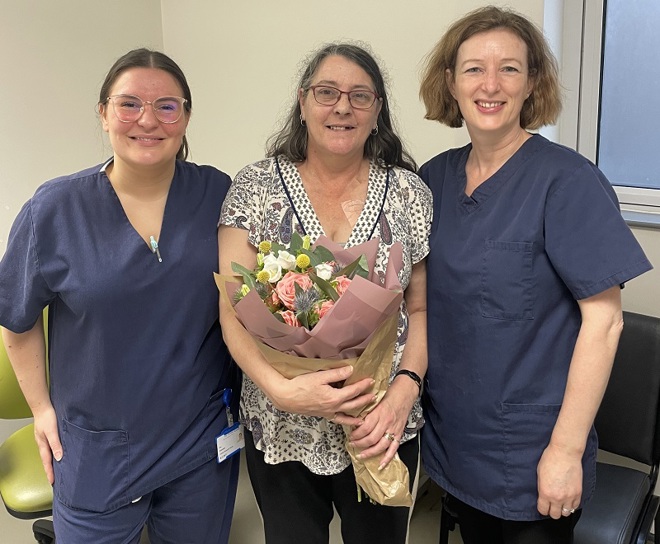Press release posted 1 February 2024
Sara Anne Morley, a 58-year-old grandmother from Sheffield has stage 4 bowel cancer, the most advanced kind. After exhausting all the standard treatment options available to her, she started on an early phase clinical trial at The Christie NHS Foundation Trust in Manchester in early 2018.
6 years on from her first treatment, her tumours are stable, and she recently completed her 100th cycle of experimental immunotherapy.
Sara, whose older brother died from bowel cancer, went to her GP in 2014 after experiencing excruciating abdominal pain and noticing that she was going to the toilet a lot more often. Because of her family history, she was fast-tracked to her local hospital, where she had a colonoscopy and was diagnosed with bowel cancer.
She was treated with radiotherapy and chemotherapy, and also had part of her bowel removed and a stoma fitted. However, she was only on the chemo for 5 days before she became very unwell and was unable to continue.
As a result of not being able to finish the full course of chemo, doctors kept a close eye on her with regular blood tests. However, in 2016, she was told that the cancer had come back and spread to her liver.
She tried every type of chemo available to her but wasn’t able to finish a full course of any of them. With no standard treatment options now available to her, she was referred to The Christie in April 2017.
She had genetic testing* which revealed that she had high microsatellite instability, or MSI-H, colon cancer, which is seen in around 5% of patients. It occurs when mismatch repair (MMR) genes, whose job is to correct errors that happen during cell division, stop functioning properly.
As a result of this discovery, she was able to be matched to trial looking at the effectiveness of an immunotherapy drug called a monoclonal antibody. This works by blocking a protein that stops the immune system from working properly and attacking cancer cells. In essence, it trained Sara Anne’s immune system to fight the cancer itself.
Sara Anne is being treated at the National Institute for Health and Care Research (NIHR) Manchester Clinical Research Facility (CRF) at The Christie.

“I ended up being hospitalised twice on standard chemotherapy but have absolutely no side-effects from this treatment at all so my quality of life is much better,” comments Sara Anne.
“All the scans since then have shown that my tumours are steadily shrinking. One has even completely gone, it’s unbelievable. If I hadn’t been put on the trial, I wouldn’t be here today. The Christie has given me my life back. They’ve given me the chance to get to know my grandchildren, I really can’t thank them enough.”
“It’s brilliant to see that Sara Anne is still doing well after so long on such an early phase trial,” comments Professor Fiona Thistlethwaite, Sara Anne’s consultant and clinical director of the NIHR Manchester CRF at The Christie.
“This is becoming a much more common occurrence as, thanks to advances in DNA testing, we’ve now become a lot better at matching patients with treatments that will at least have some benefit for them. A personalised approach like this is central to the cancer treatments of the future.”
While the trial Sara Anne is on is no longer accepting new patients, any patients interested in taking part in clinical trials should discuss this option with their consultant or GP. Not all patients will fit the criteria for a specific trial. While clinical trials can be successful for some patients, outcomes can vary from case to case. More information about taking part in clinical trials can be found on our taking part in studies and trials page.
*This was part of another trial called TARGET. Funded by The Christie Charity, researchers looked at gene changes in advanced solid cancers and how genetic information can help doctors decide the most suitable phase-1 trial for people to take part in.
